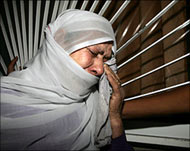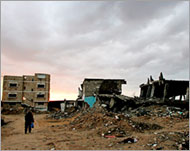Israeli sonic booms terrorising Gaza
Palestinians liken it to a bomb dropped directly over their heads leaving them shaking and shocked; human rights groups call it collective punishment; and the Israeli military says it is a necessary, and relatively benign, military response.

The sonic boom is the Israeli army’s latest weapon of choice employed over the Gaza Strip as retribution for rockets fired by Palestinian resistance groups into Israel.
Low-flying F-16 fighter jets break the sound barrier above populated areas, creating thunderous shock waves which shake buildings, break windows, blow off doors, and cause widespread panic, fear, and hysteria.
The practice began in late September 2005 after Israeli settlers withdrew from Gaza.
Initially, the attacks came as a response to a barrage of rockets fired by resistance groups into Israel. Eventually, the rockets stopped, but the booms continued.
Human rights groups filed a complaint with Israel’s High Court seeking to halt the low-altitude supersonic flights.
Shortly afterwards, the booms subsided.
But the army resumed the practice of what it describes as “mock air raids” last week, after an Islamic Jihad rocket landed 2km south of the Israeli city of Ashkelon in response to the assassination of its leaders.
Psychosomatic effects
According to Eyad Sarraj, a Palestinian psychiatrist, the attacks are terrorising the population and resulting in an array of psychosomatic effects ranging from anxiety attacks, seizures and nausea to nosebleeds and miscarriages.
|
“Although it is not lethal, it can lead to death indirectly, of unborn children, it can lead to highly traumatising effects on children particularly, and adults too” Eyad Sarraj, |
“Although it is not lethal, it can lead to death indirectly, of unborn children, it can lead to highly traumatising effects on children particularly, and adults too,” he says.
“Repeated attacks of that kind have resulted in widespread bedwetting and behavioural changes, depression and anxiety symptoms, in both children and adults.”
Sarraj says the sonic attacks are particularly traumatising on children below the age of six, who cannot distinguish between real and simulated bombings and perceive loud noises as threats and danger.
“I have seen children who have changed completely after being subjected to sonic booms, from sociable to clingy and anxious, crying all the time.
“Some of them do not eat or sleep as they used to. Older children have difficulty concentrating, while others became violent.”
The Palestinian Ministry of Health says there was a 30-40% increase in the number of spontaneous miscarriages during the period 27-29 October, when the use of the sonic boom was at its peak.
Dr Mauia Hassanayn of the Palestinian Ministry of Health added that 77 people, mainly children and elderly women, were taken to the hospital after the latest spate of sonic attacks in December, suffering from nausea and shock.
Some of the more serious cases involved internal bleeding in the brain and five pregnant women aborting their babies.
Israel defends practice
The Israeli army defends the practice, saying it is one of many tactics being used to break civilian support for armed groups firing rockets into Israel.
Avichav Adrai, spokesperson for the Israeli army, told Aljazeera.net: “The purpose of these ‘mock air raids’ is to make those who fire Qassam rockets into Israel think twice about doing so. This is just one of our many tactics at our disposal, all options are on the table.”
 |
|
Attacks have brought widespread |
But Avichav says the army does not believe the sonic booms are a form of collective punishment, prohibited under the Geneva Conventions.
“Yes, these sonic booms target the Palestinian people, and the purpose is so they can pressure those who fire the rockets to stop them. We don’t see in using this method is collective punishment.”
Other proponents of the tactic argue it is a relatively “benign” military response compared to what the Israeli army could do to Gaza – that in the end, it is nothing more than “noise”.
Martin Van Creveld, an Israeli military historian, told Aljazeera.net: “You haven’t seen anything yet; shells can demolish Gaza and turn it into real devastation. We have many vital installations near Ashkelon.
“If they are hit then booms won’t be enough. I would argue the Israeli army so far has been nice and have not done anything serious.”
Criticism
Human rights groups have lambasted the military arguments as irrelevant because the practice itself is immoral and illegal, they say.
Shabtai Gold, of Physicians for Human Rights in Israel, who filed a joint claim against the sonic booms with the Israeli High Court, says: “It’s wrong to use it against civilian populations. That’s the bottom line. It’s not proportionate, and it has no justification because it’s a collective punishment.”
Sarraj, the Palestinian psychiatrist, adds that there are other motives at play, such as inducing “learned helplessness” and making the entire population captive to fear.
|
“I would argue the Israeli army so far has been nice and have not done anything serious” |
“It has nothing to do with the security of the state of Israel. It has nothing to do with the claim that we are about to confuse terrorists. It is directly offensive against the total Palestinian population of Gaza. That’s what matters,” he says.
A former member of the Israeli air force, who spoke to Aljazeera.net on condition of anonymity, also said the reasons given by the Israeli army did not stand up to scrutiny.
Fear and intimidation
The attacks usually occur in the early hours, often coinciding with the dawn call to prayer.
Sarraj explains: “It is so quiet, and suddenly … the sound itself is so loud it is like a thunder ball exactly on top of your head and it is so powerful that even when you expect it you still have that reaction of fear and intimidation and you want to hide but you don’t know where.”
Dr John Hansman, a professor of Aeronautics and Astronautics at the Massachusetts Institute of Technology, says it is the sudden breaking of the sound barrier by a fighter jet that produces the startling effect of the boom.
“One of the characteristics of the sonic boom is because the airplane is going faster than the speed of sound you get no warning, so suddenly there’s this boom, and that’s why it’s so effective at startling people,” he told Aljazeera.net.
NASA studies have found that human reactions to sonic booms are more severe than reactions to other types of noise at similar levels of noise exposure, while other research conducted in the United States has the shown adverse effects of sonic booms on domestic animals and wildlife.
Weapon of war
The use of sonic booms as weapons of war against a civilian population is atypical and rarely documented. In the 1980s, the United States broke the sound barrier above Nicaragua as part of its aerial activities against the Sandinista government.
 |
|
The attacks usually occur in the |
The sonic booms were particularly frequent when Nicaragua was about to hold elections in 1984. Shortly thereafter, Israel began employing this tactic against civilian populations in Lebanon in the 1980s and late 1990s.
Hansman told Aljazeera.net that supersonic jet overflights are militarily ineffective and energy inefficient. Their only real use is as a harassing tactic and to demonstrate air superiority, he says.
“In the US for civil aircraft, there’s actually a regulation that says you can’t go supersonic over populated areas, military aircraft are allowed to go supersonic, generally only when they are flying in their military operating areas,” says Hansman.
Similar regulations are in place in Israel, according to Yiftah Spector, a senior Israeli air force general who topped a list of 27 Israeli pilots refusing to serve in operations over Gaza and the West Bank in 2003.
“It’s absolutely forbidden to do it above densely populated areas such as Tel Aviv or Beer Sheva,” Spector says.
Gaza has one of the highest population densities in the world.
Military historians say it is possible the Israel air force has been experimenting with other potentially more serious forms of sonic booms, some amplified with devices that may make internal organs resonate, or even lead to death.
“I would certainly not put it beyond them,” Van Creveld says.